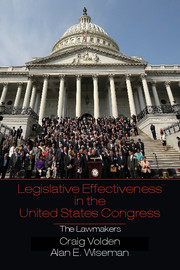Book contents
- Frontmatter
- Contents
- List of Tables and Figures
- Acknowledgments
- 1 Introduction
- 2 Measuring Legislative Effectiveness
- 3 The Keys to Majority-Party Effectiveness in Congress
- 4 A Tale of Three Minorities
- 5 Gridlock and Effective Lawmaking, Issue by Issue
- 6 The Habits of Highly Effective Lawmakers
- 7 The Future of Legislative Effectiveness
- References
- Index
- References
6 - The Habits of Highly Effective Lawmakers
Published online by Cambridge University Press: 05 November 2014
- Frontmatter
- Contents
- List of Tables and Figures
- Acknowledgments
- 1 Introduction
- 2 Measuring Legislative Effectiveness
- 3 The Keys to Majority-Party Effectiveness in Congress
- 4 A Tale of Three Minorities
- 5 Gridlock and Effective Lawmaking, Issue by Issue
- 6 The Habits of Highly Effective Lawmakers
- 7 The Future of Legislative Effectiveness
- References
- Index
- References
Summary
If the Founding Fathers came back and picked from our 200-year history one member of Congress to show how they intended the Congress to work, they would have selected Silvio Conte.
– Speaker of the House Tip O’Neill (D-MA) on Silvio Conte (R-MA)He still and for always will be thought of as a legislative giant, as someone who motored around on the floor of the House like the Energizer Bunny, moving at the speed of sound from deal to deal to deal to deal as he worked his legislative magic.
– Edward Markey (D-MA) on Edward Boland (D-MA)He was one of the great leaders in the Congress seeking health insurance for all and he worked hard to enact a decent, humane social policy for the disadvantaged.
– Fortney “Pete” Stark (D-CA) on James Corman (D-CA)For more than a dozen years before 9/11 Jim Saxton was working for better homeland security and a more coordinated defense against terrorism. It’s why he remains so effective on these issues today… . Our beaches are cleaner, our fisheries better managed, and military bases more robust because of the great work of Jim Saxton.
– Chris Smith (R-NJ) on Jim Saxton (R-NJ)Homeless people tend not to turn out in numbers at the polls. But Mr. Vento applied himself to the issues he cared about, did his homework, made the rounds of his colleagues, carried the water, dug the ditches, fought the good fights, made the compromises, and wrote landmark legislation that became law and that made a real difference in the world.
– Betty McCollum (D-MN) on Bruce Vento (D-MN)There are numerous ways members of Congress could fail as lawmakers. On average, 90 percent of their legislative proposals die in committee. Of those reaching the floor of the House, another 20 percent fall by the wayside without passage. And, of those passing the House, nearly half never overcome the final hurdles to becoming law. If they were baseball players, these lawmakers would be batting 0.043. If they were quarterbacks, they would be completing only 4 percent of their passes. Fans would go home. Revenues would be lost. Players would be fired.
- Type
- Chapter
- Information
- Legislative Effectiveness in the United States CongressThe Lawmakers, pp. 156 - 196Publisher: Cambridge University PressPrint publication year: 2014



